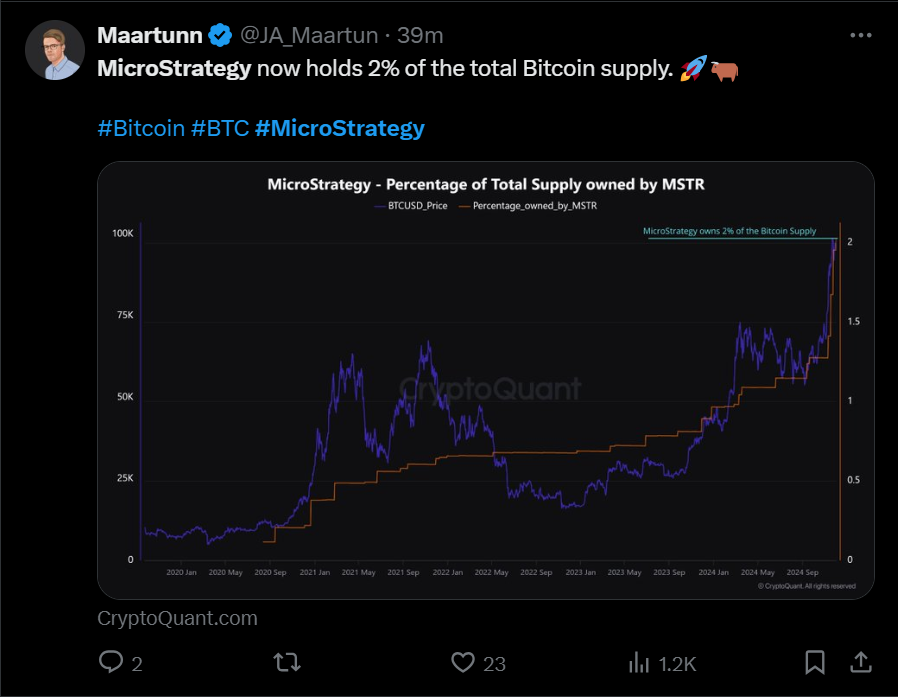In an ambitious forecast that has caught the attention of the financial world, Michael Saylor, the Executive Chairman of MicroStrategy, has shared his bold vision for Bitcoin’s future potential. During a recent speech to the Microsoft board, Saylor presented a compelling case for Bitcoin, positioning it as the “core opportunity” for the next wave of technological innovation.
His remarks, which included a slide showing BTC’s market cap skyrocketing from $2 trillion to a staggering $280 trillion by 2045, have fueled discussions about the cryptocurrency’s role in shaping global financial markets.
Bitcoin: A Core Opportunity for Technological Advancement
Saylor’s presentation focused on Bitcoin’s transformative power, portraying it as a highly lucrative, ultra-performing asset compared to traditional financial instruments.
According to Saylor, BTC offers higher annualized returns with significantly lower counterparty risks, making it an ideal candidate for future investment strategies. He highlighted that Bitcoin’s potential could redefine not only the digital economy but also the way businesses approach treasury management, particularly in large corporations like Microsoft.
With projections that place its value at $280 trillion by 2045, a far cry from its current market cap of around $2 trillion. This would position Bitcoin as a dominant player in the global asset market, which is valued at approximately $900 trillion. Saylor’s forecast underscores his belief that BTC could eclipse traditional financial instruments in terms of both size and impact.

A Revolutionary Investment Strategy for Microsoft
One of the key recommendations from Saylor’s speech was that Microsoft should consider adopting Bitcoin as a central part of its corporate strategy. Specifically, he proposed that Microsoft could allocate a budget for Bitcoin investments, which he believes would not only provide high returns but also help the company create long-term value. By doing so, Saylor argued, Microsoft could potentially displace traditional practices like dividend payouts and stock repurchase programs—strategies that, while effective, do not offer the same high-growth potential as Bitcoin.
Saylor also emphasized that this approach could dramatically increase Microsoft’s market capitalization by as much as $4.9 trillion by 2034. This forward-thinking strategy highlights the growing appeal of digital assets and their potential to reshape corporate finance.
Shareholder Influence and the Push for Bitcoin at Microsoft
Despite Saylor’s persuasive pitch, the road to BTC adoption at Microsoft is not without obstacles. The company’s board of directors has shown resistance to the idea, with a notable opposition to integrating Bitcoin into the corporate treasury. However, Saylor’s ongoing efforts to advocate for Bitcoin as a strategic asset have gained significant attention, particularly among institutional investors.
In October, Saylor publicly reached out to Microsoft CEO Satya Nadella, offering to help the company generate up to a trillion dollars for shareholders by implementing a BTC-based treasury strategy. This was part of a broader initiative to get major corporations to recognize the value of Bitcoin as a reserve asset. The timing of Saylor’s plea is significant, as Microsoft shareholders were preparing to vote on a proposal to explore BTC as a reserve asset, a measure that was, at the time, recommended against by the board.
Analysts suggest that the influence of institutional shareholders, including giants like Vanguard, BlackRock, State Street, and Fidelity, could play a crucial role in determining whether Microsoft ultimately embraces BTC. While the board’s stance may be a hurdle, Saylor’s advocacy has certainly lent momentum to the discussion, with more attention being placed on BTC’s potential to reshape corporate finance.
MicroStrategy has acquired 15,400 BTC for ~$1.5 billion at ~$95,976 per #bitcoin and has achieved BTC Yield of 38.7% QTD and 63.3% YTD. As of 12/2/2024, we hodl 402,100 $BTC acquired for ~$23.4 billion at ~$58,263 per bitcoin. $MSTR https://t.co/K3TK4msGp0
— Michael Saylor⚡️ (@saylor) December 2, 2024
Bitcoin as the Future of Corporate Finance
Saylor’s arguments are not unique to Microsoft. They echo broader trends in the financial world, where BTC and other digital assets are increasingly being seen not just as speculative investments but as viable tools for corporate treasury management. With inflation concerns, volatile fiat currencies, and growing distrust in traditional banking systems, BTC has emerged as an appealing hedge and store of value for many large institutions.
What Saylor is proposing is more than just an investment in BTC—he is calling for a fundamental shift in how corporations approach their financial strategies.
If companies like Microsoft were to adopt Bitcoin as a core asset, it could signal a broader movement toward digital currency integration in mainstream finance. This could have profound implications not only for businesses but also for the global financial ecosystem as a whole.
Related news: Shiba Inu Surges 15% in 24 Hours Amid Predictions of New All-Time High








